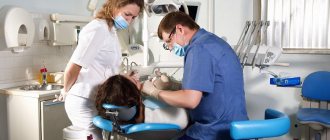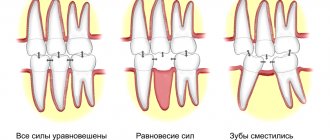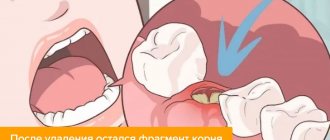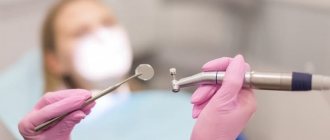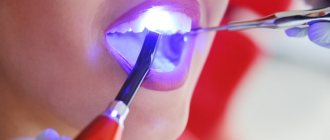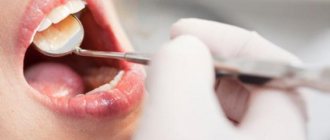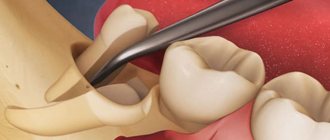Degree: Orthodontist
The most common entrance exams:
To enter, you must have a medical education in general medicine or pediatrics.
Orthodontics is one of the most promising branches of dentistry. Orthodontists help their patients solve bite problems. Professionals deal with the elimination of defects in the maxillofacial region as a whole, or in individual teeth. The work of an orthodontist is not easy not only physically, but also psychologically, since you need to be able to accurately predict the outcome of treatment, otherwise an error in correcting the bite may be noticed only after several months.
Professionals can choose an individual treatment method and the most suitable devices. As a rule, to correct bite deformities, braces are used, which are installed and removed by the doctor himself, who determines whether such technology is suitable for the patient.
Profession dentist: pros, cons, who is suitable
Let's talk about the advantages of the profession, because being a dentist is not so easy. Among the advantages:
- Prestige and high pay, even when working not in a private clinic, but in a municipal hospital or clinic.
- The opportunity to help people who experience pain and discomfort, make their lives easier with the help of your knowledge and skills.
- Demand is another factor that plays an important role when choosing a profession.
- Doctors are always in short supply, and professionals in their field can easily find work, even in times of crisis.
- Doctors often undergo training and improve their skills in other cities or even countries, learning from the experience of colleagues and applying it in practice.
Working as a dentist may seem routine, but knowing his job, the doctor will easily cope with it and at the same time will enjoy treating people. Helps them improve their health and cope with pain.
Future profession
Training in this specialty will ensure the preparation of qualified personnel who will be able to fully realize themselves in their future profession. The graduate will be able to:
- receive patients, conduct a survey and examine the condition of their oral cavity, detect existing defects and make diagnoses;
- select the most appropriate treatment technique, predict results and explain the treatment process to the patient;
- take into account all the features of the current condition of the patient’s teeth and prevent the occurrence of more complex situations;
- conduct routine examinations of patients to monitor their condition;
- competently prepare medical documentation and manage patients.
The doctor's qualification level increases with his experience. Also, each doctor undergoes advanced training courses in order to keep abreast of all the new developments in the field of dental occlusion treatment.
Dentists' specializations
Like many other specialties, dentistry has a number of specializations, which can be trained in universities in our country.
Dentists are different
In simple terms, a dentist is a general term that refers to a doctor who deals with diseases of the oral cavity.
Dentistry specializations are narrow-profile activities associated with a certain age of patients, characteristics of diseases, and so on.
All this is worth talking about in more detail.
Therapeutic activities in the field of dentistry are familiar to most of us.
After all, it is the therapist who examines our teeth, detects caries, tartar, and gives advice related to the prevention of certain diseases through proper hygiene.
We go to the surgeon in case of dental injuries, for example, received at a boxing competition. This person also deals with the treatment of wounds in the mouth and neck, standard procedures for tooth extraction and prosthetics.
An oral and maxillofacial surgeon is called upon to help us solve more complex issues related to our health. Procedures performed by a regular surgeon are performed under local anesthesia. For the work of a maxillofacial surgeon, general anesthesia is required.
We meet a pediatric dentist quite early, at approximately six months of age. After all, it is at this moment that most children begin to grow their first milk teeth. We will continue to see the same specialist until adolescence.
Where to apply
Training in this specialty is offered by the following universities in Moscow and other Russian cities:
- Belgorod State National Research University;
- Krasnoyarsk State Medical University named after. Professor V.F. Voino-Yasenetsky;
- Yaroslavl State Medical University;
- Ural State Medical University;
- Kursk State Medical University;
- Moscow State Medical and Dental University named after A.I. Evdokimova;
- Siberian State Medical University.
In total, there are about 65 higher educational institutions in the Russian Federation that offer education in the specialty 08/31/77 “Orthodontics”.
How long to study to become a dentist after grades 9 and 11
As we said earlier, you can study the “dental craft” both after the ninth and after the eleventh grade. However, this also has its own characteristics.
You can start studying after 9th and 11th grade
After the ninth grade, you only have the right to go to college and receive a secondary specialized education there.
When you graduate from college, you won't be given a dentist's degree. In such an educational institution you can master the specialty of a dental technician.
As such, you will not have any work with patients related to pulling out teeth, prosthetics, or removing stones.
Your activity will consist of manufacturing all kinds of devices and devices that facilitate direct dental activities related to the treatment of patients.
By the way, don’t think that getting this specialty is easy. You will need to have a good understanding of medicine, be able to draw (models of future products), and know the basics of design science, chemistry and biology.
Disciplines studied
In the process of receiving education, the student will study the following subjects:
- social hygiene and public health;
- organization of medical orthodontic care for the population;
- normal and pathological anatomy of the head;
- diagnostic methods in orthodontics;
- technologies for treating patients with diseases and deformities of the dentofacial area;
- orthodontic instruments and equipment;
- development and prevention of dental anomalies and deformations;
- anomalies and deformations of teeth and jaws;
- occlusion abnormalities;
- defects of the jaws, dentition and marginal periodontal disease;
- injuries of the maxillofacial area, pathologies in the development of the face and jaw.
Some specialties for elective study of ordinates can be chosen at will.
First Moscow State Medical University named after. I.M.Sechenova
Children's and adult dentists, surgeons, orthodontists, and orthopedists are trained here. To become one of the 119 dental students in the budget department in 2013, it was necessary to score at least 270 points in three Unified State Examinations. The passing score for a paid department is no less than 171. First Med is a leader in the development of innovative teaching technologies. In particular, the first “Training Virtual Clinic” in Russia was created here - virtual clinical departments, specialized simulators, training programs, and instead of teachers - telementors. A great advantage of the university is its own clinical base, the departments of the Faculty of Dentistry are located on the basis of five clinics and a hospital for maxillofacial surgery. In addition to specialists with higher education, the university trains dental technicians; 15 budget places are open in this department.
Acquired skills
During his studies, the future orthodontist will learn:
- collect anamnesis, conduct clinical and laboratory tests to assess patient data;
- determine the degree of mobility of teeth and oral mucosa;
- perform probing of periodontal canals, administer medications, irrigate gums and teeth with medications;
- remove hard and soft deposits on teeth;
- provide assistance to patients with pulpitis, caries, periodontitis;
- remove baby and permanent teeth;
grind tooth tissue, take impressions from the jaw and face, cast diagnostic and working models of jaws;- design devices, engrave and mark jaw models;
- apply and adjust intraoral removable and fixed appliances;
- prepare teeth and jaws for upcoming prosthetics;
- perform splinting when the patient is injured.
This is not a complete list of skills and abilities that a student will master while studying at a university. All knowledge will be applied in practice before graduation, which provides a large amount of practical training.
How long does it take to study to become an orthodontist?
As we noted earlier, an orthodontist deals with the correction of “natural” deformations of the dentofacial apparatus. In most cases, children turn to an orthodontist, because many dental diseases manifest themselves quite early.
It is orthodontists who correct facial asymmetry, change the shape of teeth, and remove excess teeth. In the office of this specialist, you can get braces, veneers, and lumineers.
In order to master this profession, you must pass all the same exams that we indicated earlier. Upon entering the university, you need to choose the training profile of orthodontists.
Perhaps, as such, narrow-profile training will only take place in the last years of study, and at the initial stage you will receive the basic knowledge necessary for dental practice.
After graduating from university (5 years), you will need to go through an internship and residency (4 years), after which you can begin independent medical work.
Concluding our conversation, the following should be noted. Despite the fact that the training of dentists takes such a long period of time, future doctors gain real knowledge through practical means during internship and residency.
By the way, it is during the period of residency that many young specialists find decent jobs.
You should not give up such a profession for fear of the above-mentioned shortcomings, because the undeniable advantage of a dentist is his widespread need and good salary.
In this video you will learn about the dental profession first hand:
Benefits of postgraduate study
After residency is completed, you can enroll in graduate school and continue to improve your level of knowledge. The student will be able to gain important managerial and pedagogical competencies, which will allow him to significantly expand the expected list of positions held.
Also, upon completion of graduate school, a dissertation is written and defended, which allows one to obtain the degree of Candidate of Dental Sciences. This will have a positive impact on the salary level of the future specialist, regardless of whether he works in a public or private medical institution.
Medical School No. 1
The oldest medical school in Moscow has existed for more than 200 years. Here, 70 students are annually recruited for the specialty “Orthopedic Dentistry”, the competition is held based on the average score of the certificate. The school operates a distribution system at the request of the Moscow Department of Health. Dental technicians are employed in children's and adult urban dental clinics. Those who want to work in commercial medical centers find work on their own. 15% of 2013 graduates continue their studies at medical universities.
Requirements for the specialty
To work as a dentist, you need to graduate from college. Dental college training is only sufficient for a medical assistant or nurse. However, there are no career prospects for these specialties.
In addition to specialized education, a dentist will also need accreditation and practical skills.
Basic requirements for the knowledge and skills of a dentist:
- know the structure of the dentofacial apparatus;
- master modern methods of diagnosis and treatment;
- be able to use dental equipment;
- know everything about the medications used and filling material.
A future doctor would benefit from knowledge in the fields of pharmacology, chemistry and biology.
How to proceed
When I entered St. Petersburg State Medical University, there was no Unified State Exam, there were regular entrance exams. My friend and I went to tutors, which gave some minimal guarantees, but I didn’t need them. I won’t deny that there has always been cronyism in medical school. Few people at that time acted on their own, although there were some. Those who came from the region were greatly helped by the targeted distribution, and excellent students had the opportunity to take only one exam. But no matter what the cronyism is, you have to study at medical institutes, otherwise you’ll drop out, sooner or later.
Career growth of a dentist
Dentists are divided into categories: first, second and highest. To confirm the first category, you need experience (three years), protection of the following categories after seven and ten years, respectively.
Confirmation is carried out before the commission with a report on the work done. To advance up the career ladder, you need to be a talented and hardworking doctor; your merits will not go unnoticed.
What does an orthodontist do?
Orthodontists deal with:
- correction of abnormal jaw development;
- alignment of the dentition (row);
- treatment of soft tissues;
- installation of braces;
- restoration of lost tooth fragments.
Most often, doctors have to work with patients who have malocclusion. Jaw pathologies can also occur as a result of injuries. Another important task of the orthodontist is to prepare the patient for the process of prosthetics or installation of implants.
Characteristics of the profession - what it does, functions and responsibilities
Let's see what specializations dentists have:
- The therapist is the doctor to whom you turn first. The general practitioner analyzes the general condition of the teeth. Finds problem areas, treats caries, removes nerves, puts fillings and restorations, and prepares teeth for prosthetics.
- The surgeon performs operations in the oral cavity: removes teeth, restores the jaw after injuries, prepares the oral cavity for implantation, prosthetics, orthodontic and orthopedic treatment. Deals with problems related to inflammatory processes, cysts and tumors.
- The orthodontist corrects malocclusion - a situation where the jaws do not close evenly, but with a deviation to the right or left, corrects the curvature of the teeth - increased crowding, in which the teeth have “not enough space” and they run into each other or vice versa. The result of his work carries an important aesthetic point for the patient.
- Orthopedist – comes to the rescue when teeth are missing. Restores them with the help of dentures, removable or permanent, and fully reproduces the important chewing function. If it was possible to save a small part of the tooth, then it uses restoration technology using a crown. This doctor works in tandem with a dental technician - a specialist in the manufacture of dentures and prosthetic elements for a specific case.
- Hygienist is a relatively new field. Monitors the cleanliness of the oral cavity, carries out preventive and hygienic procedures to maintain oral health. Removes plaque, tartar, polishes enamel. Provides consultations regarding the prevention of dental diseases.
- Implantologist – specializes in restoring lost teeth using implants. Innovative technology allows you to install tooth analogues that are no different from real ones. Conducts a full examination, preparation in several stages and the implantation itself. Observes the patient throughout the entire period of rehabilitation after the intervention.
- A pediatric dentist is a doctor who deals with children's dental problems. Removes and treats baby teeth so that the molars are formed healthy, puts fillings, fights diseases associated with the oral cavity, which children are prone to at an early age. A pediatric dentist should not be a doctor, but a kind wizard who will convince the child to treat his teeth and be able to perform all the manipulations without tears.
Salaries
Of course, you can’t count on a good salary right away. Many dentists are already working and earning money while studying to become an orthodontist. Then you recruit your patients for another six months, and then everything depends on you. An orthodontist earns above average; with a full-time job, you can easily count on 100,000 or 150,000 rubles; we most often work for a percentage, so how many patients are left is how much we will earn, and this depends on the economic situation in the country and on time of year. In July, for example, you can safely go on vacation.
In general, 10 years after graduating from university, I realized that everything depends only on you. The saying “he who does nothing makes no mistakes” is definitely about doctors, and if you are not afraid of difficulties, are ready to learn all your life and love your work, everything will work out.
Personal qualities of a doctor
A good dentist has the following qualities:
- responsibility;
- attentiveness;
- calm;
- perseverance;
- equilibrium;
- observation;
- accuracy;
- concentration;
- patience;
- goodwill;
- communication skills;
- tact;
- determination.
A doctor must be able to listen and find an approach to the patient. He will need well-developed hand motor skills, since he will need to perform movements with pinpoint precision in limited space. It is advisable to have high visual acuity to see the smallest details.
